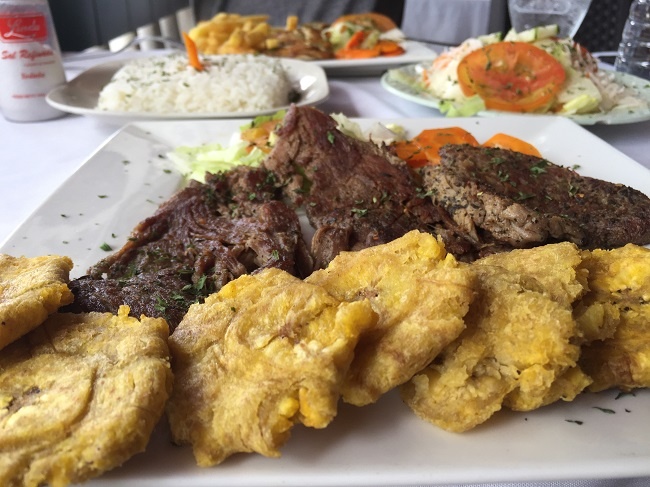Teaching English in Santo Domingo, Dominican Republic: Alumni Q&A with Leila Tatum
Written By: International TEFL Academy | Updated: June 29, 2023
Written By: International TEFL Academy
Updated: June 29, 2023

TELL US ABOUT YOURSELF
What is your citizenship?
United States
What city and state are you from?
Atlanta, GA
How old are you?
38
What is your education level and background?
Master's degree or Higher
Have you traveled abroad in the past?
Some international travel with friends, family, business, etc.
If you have traveled abroad in the past, where have you been?
Jamaica, Mexico, France, Morocco, Canada, Puerto Rico (technically not abroad)
What sparked your interest in going to teach English abroad?
I enjoy mission-oriented professions where you get the chance to make a difference and help others. I am passionate about education, and I also love to travel. Teaching English abroad checks all of the boxes.
What were some of your concerns before teaching abroad?
I was concerned about adapting to a new culture, being away from my family, learning the language, finding a job that pays enough to cover my expenses, and making friends.
What did your friends and family think about you moving and teaching abroad?
My family was very supportive and encouraging.

TEFL CLASS INFORMATION
Why did you decide to get TEFL certified and choose International TEFL Academy?
Doing the research, I found that getting TEFL certified gives you a better chance at getting hired if you don't have an education degree and/or experience in the classroom.
Which TEFL certification course did you take?
Online TEFL Course
How did you like the course?
My instructor was very engaging. She took the time to share her experiences and answer questions. The course material was helpful and interesting. The pace is a little fast but manageable. The best part was the practicum experience. This allowed me to take what I learned in the course and apply it in the classroom.
How has your TEFL training helped you in your current teaching position?
The teaching strategies I learned in the course have been invaluable. Also the practicum really helped me to get a grasp of the classroom environment.
Which city and country did you decide to teach English in and why?
I decided to teach English in the Dominican Republic in the city of Santo Domingo. I'd visited the D.R. several times in the past. I have a few friends here, and I was at least familiar with the country enough so that I wasn't going in totally blind.
 How long have you been in this country and how long do you plan to stay?
How long have you been in this country and how long do you plan to stay?
I've been here 4.5 months. I'm not sure how long I'll stay yet. I'm committed to finishing the school year and see where it leads.
What school, company, or program are you working for?
My contract does not allow me to discuss my employer.
During which months does your school typically hire?
Summer months, especially July
Did you secure this position in advance of arriving?
Yes
How did you interview for this position?
Skype/Phone Interview
What kind of Visa did you enter on?
Tourist Visa
Please explain the visa process that you went through.
I paid the $10 fee at the airport to get the tourist card; but I am in the process of applying for residency.
Please note: If you want to work here legally, you need to get a work visa or enter on a residency visa and then go through the residency approval process. Very few employers want to hire someone without the proper paperwork, and if they are willing to work with you, they may take advantage of your lack of other options. Also, it is extremely difficult to obtain a visa while in country.
Lastly, very few employers like to hire you before you arrive because that means sponsoring your visa which they don't want to do. Ideally, potential employers prefer you to be in-country and with valid residency.
What are the qualifications that your school requires for teachers? Please check all that apply
- Bachelor's degree
- TEFL Certification
- Native English speaker
What is the best way to apply?
Email
Tell us about your English teaching job!
Work hours: On paper, my job is 35 hours a week. However, there are mandatory meetings every day in the afternoon, special events scheduled outside of regular work hours. Also, most of your lesson planning, activity prepping, classroom decorating, is performed outside of your contracted work hours. So, my hours vary, but end up being more like 50 hours a week on average.
Pay: My contract precludes me from disclosing this, but generally jobs pay very poorly here. You really need to have two jobs to cover everything.
Savings: So far I've been unable to save.
Type of school: I work for a private bi-lingual school for infants up through kindergarten.
Vacation time: I get paid vacation during the December holiday break (about three weeks). I also get paid when the school is closed for national holidays. We do not get paid for the summer break (mid June through mid-august).
How did you find somewhere to live and what is it like? Do you have roommates?
I looked around in the neighborhoods near where I work. There is a classifieds site (corotos.com.do), but most of the apartments listed are being advertising to tourists and expats which means the apartments are way over priced. If you see something listed in American dollars, I promise you that it is way overpriced.
In order to find an apartment, you have to look for "for rent" (se alquilar) signs and stop to inquire or call the number on the sign. It is an arduous process that can sometimes take a while. Also, don't be afraid to negotiate.
COUNTRY INFORMATION - FUN!

Please explain the cultural aspects, public transportation, nightlife, social activities, food, expat community, dating scene, travel opportunities, etc...
Cultural aspects: The Dominican Republic is a Latin American country situated in the Caribbean. It shares the same island with Haiti. People here are very welcoming, and most strangers will offer to help. Like most developing countries where you see a lot of poverty, there are people who will try and take advantage of you. A large portion of the population lives in extreme poverty.
The major cities are Santo Domingo (the capital) and Santiago. They are like any large city, densely populated and congested with traffic. However, these cities are your best options for finding jobs as well as for traditional shopping and entertainment options. Also, electricity and internet are more stable in the large cities as well.
In the rest of the country, electricity is not stable and internet is hit or miss. In some areas, there is no internet.
Food: Traditional food includes staples like rice, beans, plantains, tropical fruits, and sugar. Popular dishes are moro (rice with beans and/or other vegetables or meat cooked in it), habichuleas (beans), guandules (pigeon peas), lokio (rice with chicken cooked together) and mangu (unripe plantains boiled and mashed). You can find cooked food in abundance and cheaply if you are willing to eat street food. Traditional restaurants can be somewhat expensive.
Public transportation consists of public and private buses (autobus), private van/trucks/cars (guaguas/carritos) often overflowing with people and with the door missing usually or at least left open in transit. Uber is available only in Santo Domingo.
Nightlife: The nightlife is vibrant and abundant; there are bars and clubs everywhere. Also, people love to hang out and drink and listen to music at the local colmados (neighborhood corner store).
Expat community: I understand that there is a large and thriving expat community here, specially retirees. I have not hooked into it much other than to join the Facebook groups. I spend most of my time with locals.
Dating scene: I understand the dating scene is very vibrant. However, it is not uncommon for men to have more than one girlfriend as well as a wife and the same for women with more than one boyfriend. Also, being a foreigner can make you a target for someone who thinks you have means or can at least help them get a visa. This sounds pessimistic but it is spot on. There are whole websites dedicated to this topic.
Travel opportunities: Traveling within the island is doable without a car if you are adventurous. Renting a car would be better, but can become costly. The D.R. has a lot of natural beauty from stunning beaches, to mountains, to waterfalls, to rain forests.
Traveling outside of the D.R. is costly because flights are very expensive.
COUNTRY INFORMATION - MONEY
What are your monthly expenses?
My budget:
Rent: $300 USD This is decent for the area I live. You can find cheaper and you can find much much much more expensive apartments.
Food: For 2 people its about $250 USD, but it depends on what you eat. If you eat like locals (rice, beans, plantains, etc), it's cheaper. If you continue to eat an American diet, you will pay more. My diet is somewhere in the middle.
Social: $100 - I go out to eat 2-3 times a month, and I like to get around the city quite a bit on the bus or Uber. If you are a social butterfly or you like to party a lot, you need to double or triple this budget. It also depends on where you go (trendy spots or the laid back local spot).
Communication: $75 - this includes my cell phone plan and my home internet plan
Travel: This amount changes frequently. Just remember that there are a ton of places to see on the island. Also, there are a number of Caribbean destinations just a short flight away. Travel can be costly. Flights are very expensive here.
How would you describe your standard of living?
My standard of living is just barely comfortable. I don't travel much. My apartment is humble but not terrible. Remember that furniture and domestic appliances are very expensive here and most apartments do not come with ANY appliances (no stove, no fridge, etc). So starting from scratch it can take a while to save enough to get what you need in your apartment.
In your opinion, how much does someone need to earn in order to live comfortably?
$1,000/month for 1 person is fairly comfortable though not extremely so. You can get by on less, but its not as comfortable.
ADVICE FOR PROSPECTIVE ENGLISH TEACHERS
What advice would you give someone planning or considering teaching abroad? Would you recommend teaching in your country?
Take the leap! Don't be afraid. You won't regret it. Pick somewhere you've always wanted to go and just do it. The Dominican Republic is both beautiful and also deeply flawed. If you think you are going to live some fantasy life on the beach, then bring lots of money with you. Also, the less expensive non-"touristy" beaches are covered in trash....literally. This is a developing country, so be prepared for all that entails. But if you are up for the challenge, the experience can be very educational and fun.
Posted In: Teach English in Latin America, Teaching Abroad Over 40, Santo Domingo, Teach English in Dominican Republic
International TEFL Academy
Founded in 2010, International TEFL Academy is a world leader in TEFL certification for teaching English abroad & teaching English online. ITA offers accredited TEFL certification courses online & in 20+ locations worldwide and has received multiple awards & widespread recognition as one of the best TEFL schools in the world. ITA provides all students and graduates with lifetime job search guidance. ITA has certified more than 50,000 English teachers, and our graduates are currently teaching in 80 countries worldwide.
Want to Learn More About Teaching English Abroad & Online?
Request a free brochure or call 773-634-9900 to speak with an expert advisor about all aspects of TEFL certification and teaching English abroad or online, including the hiring process, salaries, visas, TEFL class options, job placement assistance and more.







